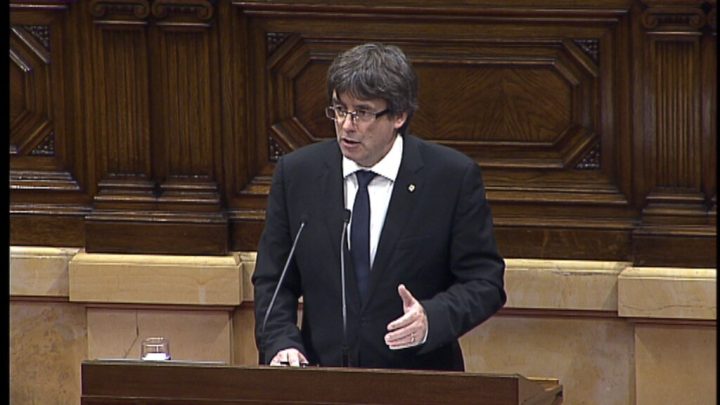Catalonia suspends its declaration of independence.
On the 10th of October 2017, Catalonia could have achieved a dream that generation after generation have been demanding as the right of a people, of a culture for more than 300 years.
Something that seemed to be in the distant future has accelerated closer in time and today could have been turned into a reality, but the conditions did not allow it. There wasn’t support. The massive call has been to opt for dialogue and not propose the Unilateral Declaration of Independence (UDI).
President Puigdemont, unlike the other separatist parties, has listened to those voices, above all the advice of European Commission President Donald Tusk, and is giving priority to dialogue and delaying the declaration of independence after declaring that there was a Yes for independence.
In a climate of tension since the referendum and aggression of the 1st of October, the Catalan people today feared that the situation would lead towards a possible catastrophe. It wasn’t enough to have voted Yes, now resolving to implement the Yes could lead to reactions from the Spanish government of a serious nature, such as the application of article 155 of the Spanish constitution in which Catalonia would lose its autonomy. To this could be added the decision of leading businesses and financial institutions to start moving their headquarters out of Catalan territory.
The queues at the banks for three days now have aggravated the situation in the population that once again, and as already happened in the most serious moments of the crisis, see their savings in danger.
The situation experienced in these last ten days has been anxious because there has been a complete lack of support and mediators. Fear of the army, fear of extreme violent positions, fear of fascist attitudes, fear of getting poorer and losing one’s savings, fear of an uncertain future.
The social map has been drawn with three profiles: Separatist, Spanish and those without a flag, dressed in white calling for dialogue. In this situation, to give way has been the most intelligent discourse, to draw back before opposing a great force; to ask for dialogue before responding with resentment.
In this expected declaration, that from the early hours of the morning had helicopters circling over the parliament and led to more than 1000 journalists seeking accreditation and that was delayed by last minute changes, increasing the people’s tension even more, the president of Catalonia recalled the desire of the Catalan people:
“The people of Catalonia have demanded the freedom to be able to decide for years. It’s very simple. We have not found anyone to dialogue with in the past nor are we finding one in the present. There is no State institution that is open to talking about the claim of the majority of this Parliament and of Catalan society. The last hope we could have left was for the monarchy to exercise the arbitration and moderating role that the constitution attaches to it, but last week’s speech confirmed our worst assumptions.”
And after a lot of context in which he called for democracy and peace, he declared independence:
“Arriving at this historic moment, and as President of the Generalitat I take it upon myself to say, in presenting to you the results of the referendum before Parliament and our co-citizens, that the people have determined that Catalonia should become an independent state in the form of a republic.
And then, immediately after enthusiastic applause, he proceeded to suspend the decision:
“In with the same solemnity, the Government and I myself propose that the Parliament suspends the effects of the declaration of independence so that in the coming weeks we may begin a dialogue without which it is impossible to arrive at an agreed solution. We firmly believe that this moment needs not only a de-escalation of tension but also a clear and committed willingness to advance the claims of the people of Catalonia from the results of the 1st of October. We must keep these results in mind during the period of dialogue which we are willing to open.”
With these words, in a speech attended by the Parliament’s main political representatives, the Catalan people who yearn for independence, remain divided between an unreached dream for a legitimate right, and acceptance of a high risk situation to which a unilateral declaration of independence would have exposed Catalonia.
Catalonia starts a possible stage of dialogue, hoping that historical evolution in which people enjoy their rights to decide could mediate a dialogue in which the historical and cultural roots overcome the devastating effects of the crushing economy.










